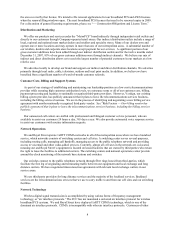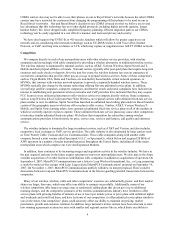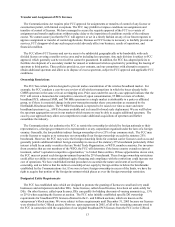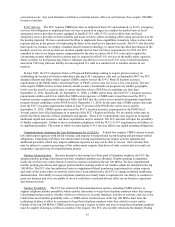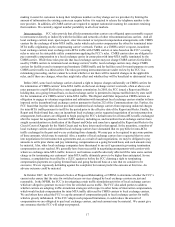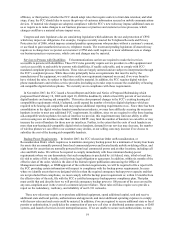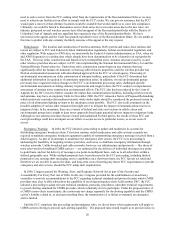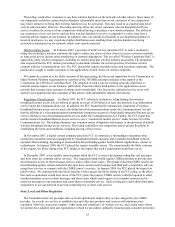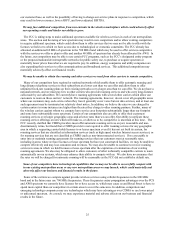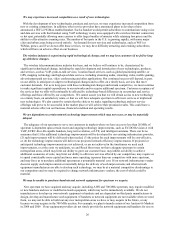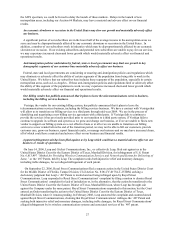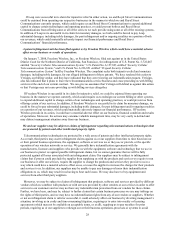Metro PCS 2007 Annual Report Download - page 29
Download and view the complete annual report
Please find page 29 of the 2007 Metro PCS annual report below. You can navigate through the pages in the report by either clicking on the pages listed below, or by using the keyword search tool below to find specific information within the annual report.
18
Universal Service Fund (USF). The FCC has adopted rules requiring interstate communications carriers,
including CMRS carriers, to “make an equitable and non-discriminatory contribution” to a Universal Service Fund,
or USF, that reimburses communications carriers who are providing subsidized basic communications services to
underserved areas and users. The FCC requires carriers providing both intrastate and interstate services to determine
their percentage of traffic which is interstate and the FCC has also adopted a safe-harbor percentage of interstate
traffic for CMRS carriers. We have made these FCC-required payments. The FCC recently started several
rulemaking proceedings to solicit public comment on a comprehensive reform of the manner in which it assesses
carrier USF contributions, how carriers may recover their costs from customers and how USF funds will be
distributed among and between states, carriers and services. Some of these proposals may cause the amount of USF
contributions required from us and our customer to increase. The FCC prohibits carriers from recovering
administrative costs related to administering the required universal service fund assessments. The FCC’ s rules
require that carriers’ USF recovery charges to customers not exceed the assessment rate the carrier pays times the
proportion of interstate telecommunications revenue on the bill. We currently are in compliance with these
requirements.
Wireless broadband carriers may be designated as Eligible Telecommunications Carriers, or ETCs, and may
receive universal service support for providing service to customers using wireless service in high cost areas. Other
wireless broadband carriers operating in states where we operate have obtained or applied for ETC status. Their
receipt of universal service support funds may affect our competitive status in a particular market by allowing our
competitors to offer service at a lower rate. The aforementioned comprehensive reform proposals may alter, reduce
or cap the amount of universal support received by CMRS ETC providers. We may decide in the future to apply for
an ETC designation in certain qualifying high cost areas where we provide wireless services, though our ability to
qualify may be affected by ongoing changes and possible future limitations in the program. If we are approved,
these payments would be an additional revenue source that we could use to support the services we provide in high
cost areas.
Regulatory Fees. We are obligated to pay certain annual regulatory fees and assessments to support FCC wireless
industry regulation, as well as fees supporting federal universal service programs, number portability, regional
database costs, centralized telephone numbering administration, telecommunications relay service for the hearing-
impaired and application filing fees. These fees are subject to change by the FCC periodically.
Equal Access. CMRS carriers are exempt from the obligation to provide equal access to interstate long distance
carriers. However, the FCC has the authority to impose rules requiring unblocked access through carrier
identification codes or 800/888 numbers to long distance carriers so CMRS customers are not denied access to their
chosen long distance carrier, if the FCC determines the public interest so requires. Our customers have access to
alternative long distance carriers using toll-free numbers.
Customer Proprietary Network Information (CPNI). FCC rules impose restrictions on a telecommunications
carrier’ s use of customer proprietary network information, or CPNI, without prior customer approval, including
restrictions on the use of information related to a customer’ s location. The FCC recently began an investigation into
whether CMRS carriers are properly protecting the CPNI of their customers against unauthorized disclosure to third
parties. In February 2006, the FCC requested that all CMRS carriers provide a certificate from an officer of the
CMRS carrier based on personal knowledge that the CMRS carrier was in compliance with all CPNI rules and the
filing of such a certificate has now become an annual requirement. We provided the certificate in February 2006 and
will provide the required annual certificates. The FCC also has imposed substantial fines on certain wireless carriers
for their failure to comply with the FCC’ s CPNI rules.
In April 2007, the FCC released a Report and Order and Further Notice of Proposed Rulemaking in which the
FCC adopted a number of changes to its existing CPNI rules which required us to make certain changes to our
business practices or processes. These rules became effective in December 2007. The FCC’ s new rules, among
other things, also require CMRS carriers to take reasonable measures to discover and protect against pretexting, and
in enforcement proceedings, the FCC will infer from evidence of unauthorized disclosures of CPNI that reasonable
protections were not taken. We believe that our current practices are consistent with the existing FCC rules on
CPNI.
In the Further Notice of Proposed Rulemaking that accompanies the Report and Order described above, the FCC
seeks comment on: whether mandatory password protection should be included for other types of information, such
as non-call detail CPNI or certain types of account changes; whether the FCC should adopt rules regarding audit
trails; whether the FCC should adopt rules that govern the physical transfer of or access to CPNI by a carrier, its


